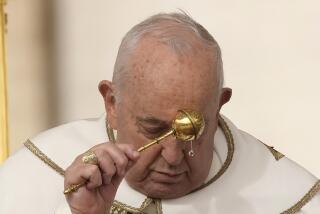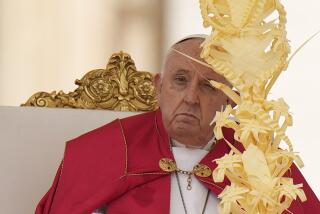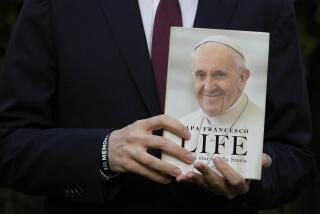Miami archbishop says pope’s visit to Cuba comes at ‘time of renewed hope’
MIAMI Miami Archbishop Thomas Wenski, who will be leading his third pilgrimage to Cuba for a papal visit this month, says it’s no accident that Pope Francis chose to go to Cuba before a three-city visit to the United States.
With the re-establishment of diplomatic relations between the United States and Cuba on July 20 after more than 54 years of hostility, the pope is coming to Cuba “at a time of renewed hope,” he said.
“Now Cuba becomes a bridge for Francis’ trip to the United States. In that sense it is very significant,” said Wenski in an interview with the Miami Herald at the archdiocese Pastoral Center in Miami Shores.
After winding up his Sept. 19-22 visit to Cuba, the pope will spend six days in the United States a trip that includes a meeting with President Barack Obama, an address to a joint session of Congress and a visit to the United Nations before he heads to Philadelphia, where the emphasis will be on families.
When Francis visits Washington, he will do so from the perspective of having just experienced Cuba’s reality and also will be able to draw from his 1998 trip to Cuba, when he was assistant archbishop of Buenos Aires and accompanied Pope John Paul II on his papal visit to the island, Wenski said.
Although he downplays his role, the pope also aided the 18 months of secret negotiations between Cuba and the United States that culminated in the Dec. 17 announcement that the two countries would begin working toward normalizing relations and had overcome an impasse over release of prisoners, including USAID subcontractor Alan Gross, who had been held in Cuba for five years.
Obama met with the pope in the spring of 2014, and in the summer Francis wrote letters to both Obama and Cuban leader Raul Castro, urging them to find their way forward on humanitarian grounds. The negotiators also were invited to the Vatican in early October, and it was there they worked out the final agreement for rapprochement.
Part of Francis’ mission as a pontiff is to be a “bridge builder,” said Sister Ondina Cortes, a theology professor at St. Thomas University. The rapprochement with the United States will “create new opportunities for reconciliation,” she said, but the process won’t be automatic and will require ongoing work.
Starting with John Paul II’s five-day visit to Cuba in January 1998 and followed by Pope Benedict XVI’s trip to Santiago and Havana in March 2012, the papal visits have built on each other as the popes have sought to gain more space for the Catholic church, the practice of faith and the Cuban people. Wenski expects that will be the case with Francis’ visit as well.
Implicit in both Benedict’s and John Paul’s remarks while they were in Cuba was the need for reconciliation between Cubans both on and off the island.
In Benedict’s homilies, he encouraged people to talk to each other, said Wenski, and in his farewell address at the airport, he talked about Casa Cuba the Cuban home as a place where all Cubans should feel at home regardless of political or ideological differences.
“That is a theme that is being spoken about much more, especially with the renewal of the relationship between the United States and Cuba,” Wenski said. “We see not only a new willingness for engagement and dialogue between the United States and Cuba but between Cubans here and Cubans there.”
As he arrived in Cuba in 1998, John Paul uttered these prophetic words: “May Cuba, with all its magnificent potential, open itself up to the world, and may the world open itself up to Cuba.”
“The homilies (of John Paul) almost present a road map of what the path forward should be,” said Wenski. “John Paul’s visit marks a before and after in the relationship of the church and the Cuban government and a before and after in a lot of things. The visit of John Paul really changed attitudes in the exile community and in Cuba, where his trip was a signal that it was safe to go to church again.”
Cuba was officially an atheist state from 1962 until 1992, and after John Paul’s visit, “the church experienced a continuing growth,” Wenski said. A seminary, one of the fruits of John Paul’s visit, opened in 2011. “Most of these seminarians who are studying for the priesthood weren’t even Catholic when John Paul II was visiting Cuba,” Wenski said. “There was certainly a sea change during his visit.”
Since then there also has been a sea change in the Cuban exile community, as newer waves of Cubans arrive, said Wenski, who not only speaks fluent Spanish, but is well versed in Cuban slang.
For John Paul’s visit, Wenski chartered a cruise ship to take South Florida pilgrims to Cuba, but there was such an outcry in the community taking a cruise ship was considered frivolous and had the connotation of going on vacation that then-Archbishop John Favalora pulled the plug after the ship had already been contracted. A smaller group of pilgrims flew to Cuba for the papal Mass.
“There were people questioning why John Paul was even going to Cuba because they feared John Paul would be manipulated by Castro,” Wenski said. “Yet this was the same John Paul II who brought down the Iron Curtain.”
Leading the charge against the cruise ship was business executive Carlos Saladrigas. “But he watched the papal Mass on television and realized he had made a tremendous mistake,” Wenski said.
Saladrigas, now a proponent of more engagement with Cuba, took part in the archdiocese pilgrimage for Benedict’s trip, and he and his wife, Olga, plan to travel to Cuba with the Knights of Malta, a lay religious order, because he and Olga also want to take part in the papal Mass in Holguin, her hometown. The archdiocese pilgrimage will only go to Havana.
At a recent symposium on Francis’ visit at Florida International University, Wenski and Saladrigas clapped each other on the back. Saladrigas said he later told Wenski he was sorry for opposing the cruise ship. “I said, ‘Carlos, I am also sorry you opposed the cruise ship,’ ” Wenski said. “But he gave me his blessing anyway,” added Saladrigas.
“This time I had people asking me if we were taking a cruise ship even people who were against a cruise ship before,” said the archbishop. “Some of them were even placing calls to see if they could find a cruise ship.” But since the Vatican only announced Francis’ visit in April, Wenski said there wasn’t enough time.
Instead, about 150 pilgrims will accompany Wenski and Cardinal Sean O’Malley of Boston on a flight to Havana and about 40 others are making other flight arrangements, said Vivian Mannerud, president of Airline Line Brokers, which is arranging the archdiocese trip. There’s a waiting list of about 100 people, she said, and had there been sufficient hotel accommodations in Havana, many more pilgrims would have gone from South Florida.
But there are still contentious issues surrounding the pope’s visit. One is whether the pope plans to meet with human rights activists and dissidents as they have requested. Pope Benedict chose not to during his visit.
“I think the Holy Father should bear witness to the suffering of the Cubans and advise the Castro regime that he unlike the last pope to visit Cuba will not remain silent if the Castros’ security police attempt to prevent human rights activists, their families and victims of the Cuban state’s repression from attending the papal Mass or to punish democracy advocates for displaying banners or signs supporting ‘freedom’ and ‘democracy’ at the mass,” said Frank Calzon, executive director of the Center for a Free Cuba.
“Pope Francis played a role in bringing Washington and Havana together to talk. I hope the pope will now ask Fidel’s brother Raul Castro, the president of Cuba, to permit Cubans to gather and talk among themselves and convene a formal and free round-table discussion,” he said.
Wenski said he doesn’t know whether Francis plans to sit down with a “specific group” of dissidents. Such a meeting is not currently on the pope’s schedule. “I think he will speak his mind and he will speak his mind publicly. What he would say if he met with dissidents privately wouldn’t be very different from what he says publicly. His public message will bring comfort and light to all of Cuba.”
During a trip to Latin America in July, the pope repeatedly touched on serving the poor, more respect for the Earth, the need for dialogue and the evils of inequalities caused by rampant capitalism.
“In Cuba, of course, the issues he raised in Latin America are germane as well,” said Wenski, “but he won’t be repeating what he said. If he were, there would be no reason for him to go to Cuba. Cuba has some unique circumstances and I think he’s going to give a different and further message in Cuba.
“I can’t predict what the Holy Father will say, but I can predict that it will be very interesting,” Wenski said.
Asked if he thought the pope would bring up the U.S. embargo against Cuba during his address to Congress, Wenski said the pope may bring up many themes from migration and the Middle East to young people and their difficult job prospects.
“If he does address Cuba that will be fine, too,” he said. “Now the key to lifting the embargo is in Congress’ hands.”
Wenski himself has been on record against the embargo since the 1990s. “I’ve been calling for an end to it for quite a long time and so has the church,” he said. “The embargo is a very blunt instrument and it ends up hurting innocent people as much or more than the guilty that it is designed to punish.
“Of course over the years in Miami, the embargo has had a different symbolism,” he said. “It has come to represent for many people for many years that we haven’t surrendered.” But as a policy tool, he said, “it hasn’t reached its stated objectives.”
For early waves of exiles who suffered harassment, humiliation and more at the hands of the Castro government, he said, “there are still scars that have yet to heal.”
Meanwhile, he said, the seeds sown during the previous papal visits are still bearing fruit. “It’s a slow process, but people in Cuba talk about ... opening space. The church is always trying to gain more space, filling it and not giving it back up.”
Wenski said he expects it will be “a great uplifting experience to greet the Holy Father in Cuba.” But unlike John Paul and Benedict, he said, this time it will be a Latin American pope celebrating Mass and addressing the Cuban people in his and their native language.
“Let him loose and let him speak in Spanish,” said Wenski, “and it might be even more effective in touching our hearts.”
(c)2015 Miami Herald
Visit Miami Herald at www.miamiherald.com
Distributed by Tribune Content Agency, LLC.
More to Read
Start your day right
Sign up for Essential California for news, features and recommendations from the L.A. Times and beyond in your inbox six days a week.
You may occasionally receive promotional content from the Los Angeles Times.






